My billion dollar error
At first, I often wanted to give up. Again and again there was a feeling that we are doing everything wrong. Make assumptions about people's problems. Solve the problems we come up with. We were looking for solutions in the dark. We had a clear vision, but the execution suffered.
We only knew that we wanted to reinvent the analytics market. Our first attempt was an analytical platform for Facebook application developers, because at that time they did not have effective analytical systems, they had to develop their own.
The product was created for Facebook application developers - and they liked it! Only they could not pay us.
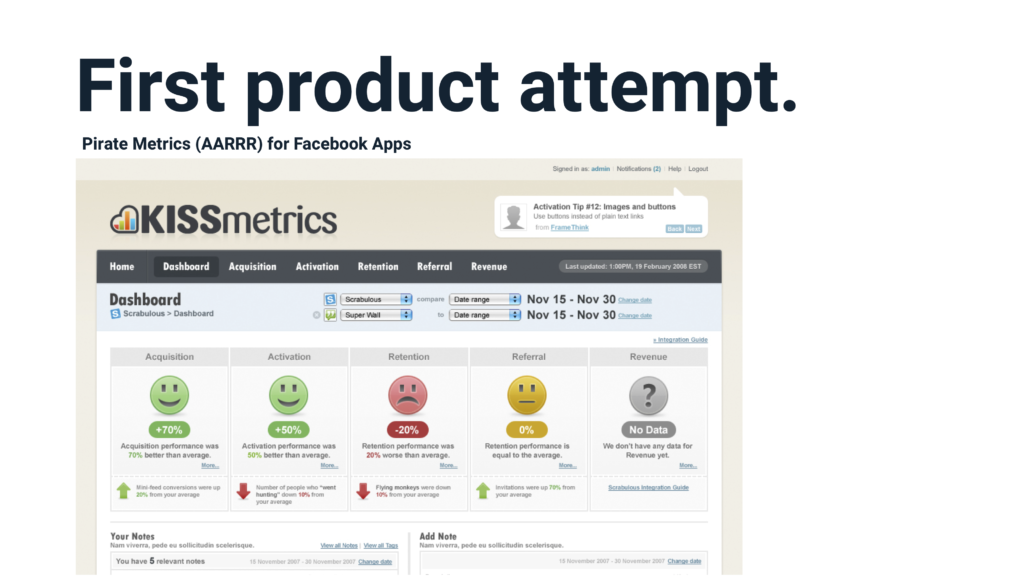
Having created a product for customers who could not pay for it, we decided to aim at everyone and everyone who does business online.
')
The second attempt was a business intelligence tool. With it, companies of all types and sizes could create a dashboard for their key indicators. It can track and customize anything.
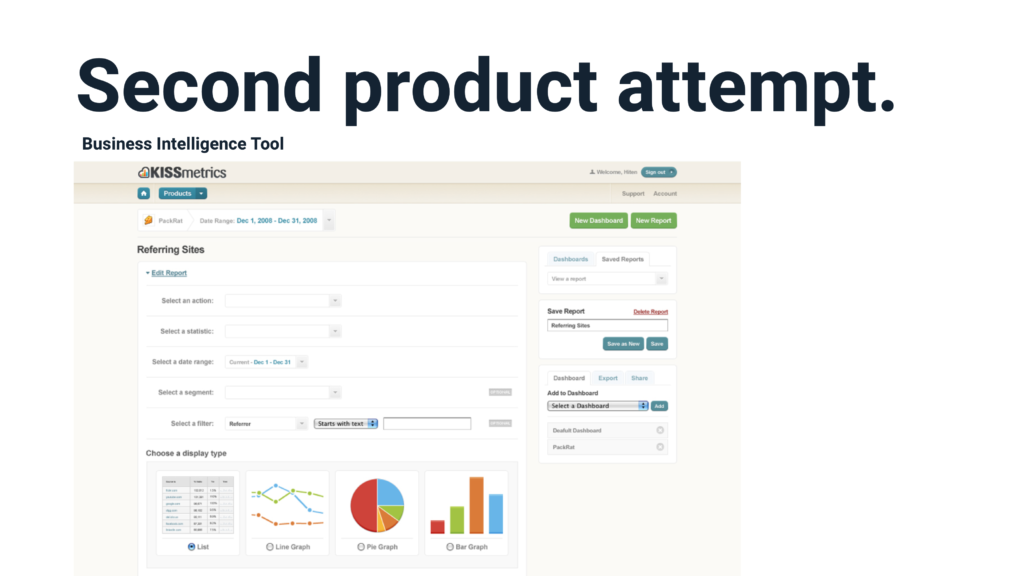
When we launched the second version, it turned out that there are too many settings for users. People did not want to spend time setting up the product. It turned out they want to get results with minimal effort. To promote this second version, we would have to become a consulting and service company.
Despite all the attempts, we did not get feedback from the two products. Clients did not care. Our team was at an impasse, and the co-founder and I were on our last legs. It seemed to us that we are doing everything wrong.
I had to revise the approach to product development. Before creating something else, we thought about our mistakes.
I had to retreat.
It was necessary to stop creating products that, in our opinion, the market needs, and return to the basics. Instead of writing code, we went out and talked to people who used our biggest competitor, Google Analytics. We asked questions to better understand their needs and current problems with analytic software. They had something to say, and we listened.
First of all, we conducted a survey of users of Google Analytics.

We learned that the main users of Google Analytics are internet marketers, and quickly figured out that we should focus on them. They needed data to increase the effectiveness of marketing campaigns for their audience, and were willing to pay for analytics that would help improve conversion.
Then we did everything right. Literally everything.
We identified the actual problems of people and focused on the lucrative market segment, internet marketers. And they created a product that solved their problems.

Moreover, we continued to create the right things at lightning speed. We have identified and satisfied every customer need.
Take, for example, reports with sequence visualization (funnel reports). Before KISSmetrics, creating such reports took too much time. Our reports have become the industry standard copied by many analytics tools.

The implementation and debugging of tracking new data in analytics tools can take several weeks. That's why we built a debugger called KISSmetrics Live. It shows in real time the exact data that is transmitted to the program.
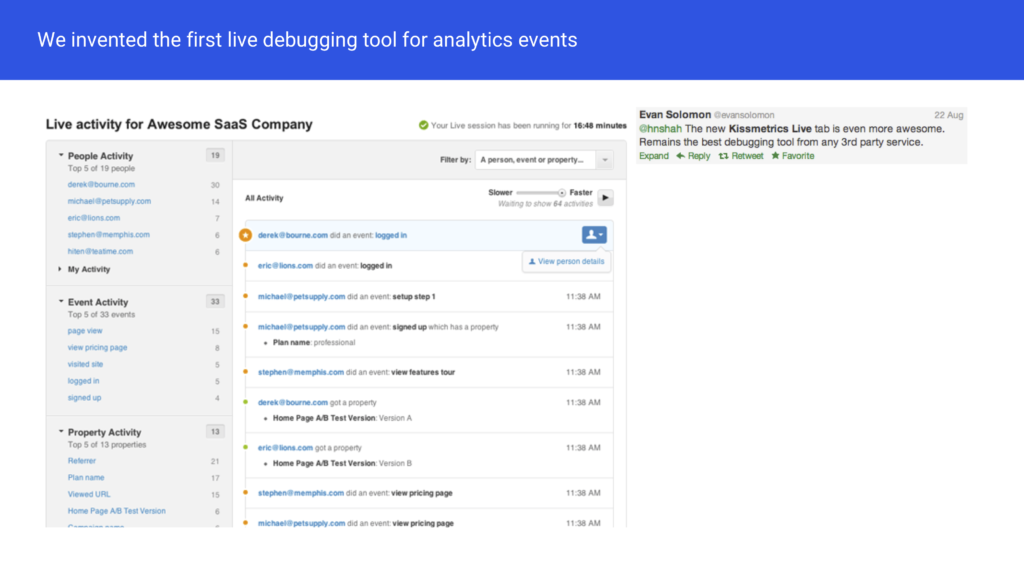
Transfer to user-level analytics tools was also impossible. You could not see for specific user data. So, we have invented a new analytical model. Each piece of data in KISSmetrics is tied to an identifier, an anonymous cookie, or an email address.

And we knew that everything worked out for us, according to enthusiastic customer reviews (for example, on Twitter) how useful our product is. We solved all the painful problems of the target audience, and people were ready to tell their friends about it. At that time we still worked in alpha and recorded hundreds of new registrations every week.
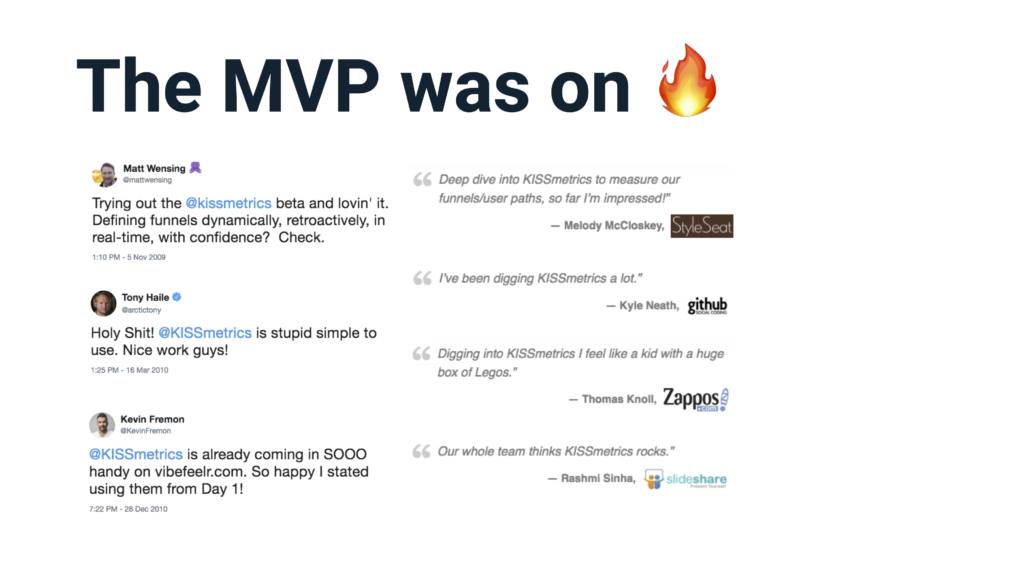
We are ahead of the market for three years. Yes, for the whole three years. In 2010, we worked out the category of analysts to such an extent that competitors could not close the gap until 2013.
We had the opportunity for a billion dollars right in front of us. Without the slightest doubt, it was possible to turn KISSmetrics into a billion-dollar startup if not screw it up.
That's exactly what we did: we screwed up.
I am the only one to blame. It was really my failure. Well, this is my finest hour.
I remember how it all began. My team began to laugh and make fun of me. Seriously, it was.
Every week, even every day, I dropped a bomb on someone in the company. Some new idea, a new direction, a new brilliant piece that I invented. Anything to do right now.
A new feature that will help us, in my opinion (in fact it is not). Idea inspired by a competitor (some minor function). Something heard from an investor, advisor or friend (and it seemed really cool at the time, I swear ... but still, it is useless). At best, the idea to me the day before threw an important client.
This went on for several months. It became so bad that I got a joke. The whole company began to call them "Hiten bombs" by my last name. I heard it in the corridors and passing by the tables.
At that time I did not understand, but a flurry of random ideas completely disbalanced the team. Good or bad, none of my ideas were based on any structure or filter. I shot from the hip. I thought that I was helping the guys focus and complete the task.
I was damn wrong.
Every time I dropped another “bomb”, everything actually exploded.
The team hastened to translate the idea into reality. My directions became a top priority. Developers got together to find the best and fastest way to accomplish what I was talking about. They attracted more colleagues and added an item to the growing list of features, bugs and customer requests. All this had to be done.
Worse, after a few really dirty, destructive “bombs” that actually didn't do any good, the team stopped listening to me. In the end, they lost confidence in me as a leader and even in the overall strategy of the company.
I set a bad example, but I expected brilliant results from the team to study the audience, dig into the data and use all this information to create functions that really mattered.
But I only worsened the situation with my ideas. First, the team came up with clever ways to deal with it.
- Hiten has another great idea that will save the company.
“I'll wait for him to repeat it three times before doing something.”
“They just dropped another bomb on me.” I ignored her.
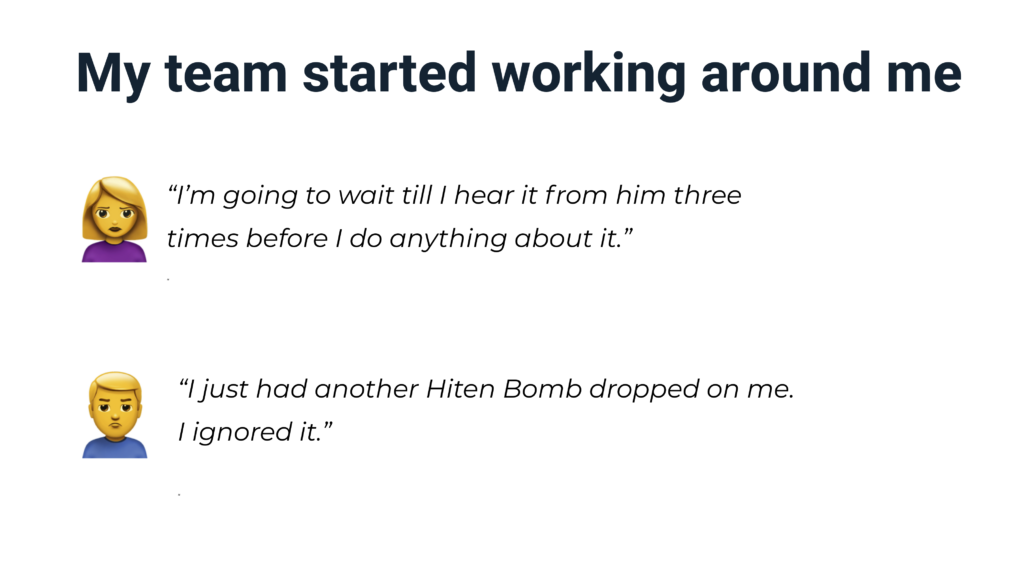
And here it happened. Our manager sent an internal note to the entire company, where he accurately described what the Hiten bomb is and how it affects the team.
"I hope everyone will understand where the tasks that seem to be outsiders come from."
People had to explain my behavior and look for excuses for him. In fact, there is no excuse for this.
After that note, I changed my behavior. If someone in the company had to make a document of 1300 words to explain my behavior, then the problem is in me, not in them.
I braked the company.
It took me so long to change. Months and months of disappointment of colleagues and subordinates, countless wasted hours, work on things that did not matter. At this time, competitors moved forward, and customers went to them.
We had everything we needed, we had the right intentions. What we didn't have was priorities, what to work on and why.
We were scattered. Each team member did what he thought was right, not knowing what was best for the business.
I did not know what to do or what to pay attention to. After several months of such work and after receiving this note, I realized that the team was feeling confused.
And I did only worse.
A good leader does not do that. He does not distract the team. Not satisfied with the hands of all the day. Does not distribute ambiguous instructions. He does not constantly drop a Hiten bomb on a team like me.
Good leaders are consistent. At all times, they direct and focus the team on what is best for the business. They are impartial, focused on performance, develop a vision, help to prioritize and balance the team. This is a great product manager every day.
This is what you need to do every day.
For a product manager or manager, nothing else matters.
Your job is to filter information that comes in every day. Remove all distractions. Decide what to focus on limited resources. Determine the right actions that actually promote your business. Get organized so that only the most important tasks are performed.
And if you do not?
At best, you lose the trust of the team. Every day they will begin to go home a little earlier, they will start digging a little longer in each product. They will not trust you as before. You have exhausted them with too many dead-end solutions and too frivolous management.
In the worst case, you will stop the development of the product and open the doors to competitors who will pass by. Believe it will happen. Even with a three-year separation from the entire industry, we profuked an advantage, and competitors caught up with our KISSmetrics system.
Inspired by the bombs of Hiten, we underestimated the influence of competitors. They began to successfully seize the market. They quickly released products, copying all our functions, since we did everything right. And then they made gradual improvements and aimed at different prospective clients that we missed.

Our product was focused on the Internet, and they quickly focused on mobile applications. KISSmetrics is still not working properly for mobile applications. One of our more agile and fast competitors ahead of us. Mixpanel focused on mobile apps long before we even thought about it.
This shift in emphasis helped them raise $ 77 million in funding. For comparison, we at KISSmetrics attracted less than $ 25 million.
Mixpanel also had a free plan (KISSmetrics did not have one) and the ability to track even more data for free by installing an icon on its website.
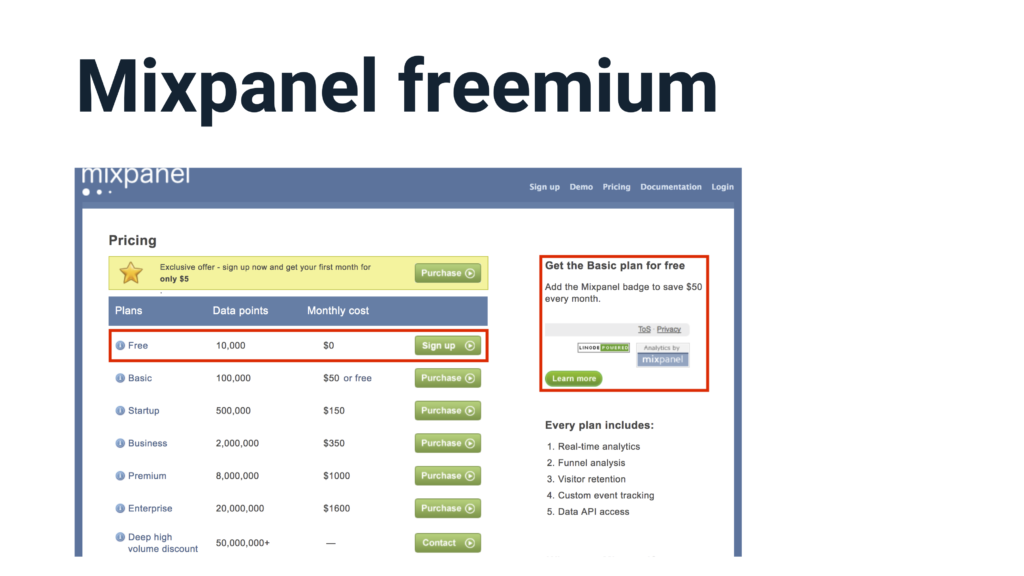
We simply dismissed their strategy because we thought it would be expensive. We assumed that the cost of customer support and infrastructure would be too high to provide something like that. And we had to copy the strategy of Mixpanel, as soon as we saw that people were hanging these icons on their websites.
We were the first on the market to create a real-time analytics tracking debugger. It was designed to help people analyze and debug their data. But we missed one big thing: visual appeal.
Viewing data in real time looks very cool when it is open and you see it. Mixpanel realized that this feature attracts paid customers. They haipanul on her much stronger than us. They also improved data viewing to make it look more attractive than ours. We ignored their actions, did not think about their causes and lost a ton of sales.
The new competitor Heap appeared even later than Mixpanel, with very simple APIs for tracking implementation. There you just need to install one script - and automatically track everything that people do on the website.
When they first started, we could easily copy the function and destroy them. We did not. They now have over 6,000 customers and a total investment of $ 40 million.
These are just a few examples where bad competition and poor performance really hurt us.
In fact, we came up with great ideas. But instead of quickly implementing them, we observed how others do it, and it takes much less time from the moment of invention to implementation. Or, we arrogantly dismissed ideas that the market desperately wanted, opening up opportunities for competitors.
We missed so many opportunities to earn even more customer love.
We ignored competitors instead of developing our market offer based on their actions. We did not prioritize product development based on correct information. As a result, we lacked this important information: instead of understanding the needs of clients based on the actions of competitors, we completely ignored them.
In the first year after the release of KISSmetrics, we tried different ideas, but nothing worked.
Then, in desperation, we tried a completely different approach. We talked with clients, identified the main tasks, listened to the market. At the moment we didn’t have a reliable process, we just knew that we had to do something else. We felt for a process that led to the creation of a truly hit product.
Two years later, we released an amazing MVP system and could not keep up with the admiring feedback on Twitter.
And then we started to slide into the abyss. A few years after starting a business, development slowed down. We were no longer innovators and leaders. We grew the team, but slowed down the pace of development. It was not long to wait for the competitors to take the lead. In the end, they did it.
They will copy your functions and leave you behind. If they are good at copying, they are hardly particularly talented in innovation. But any improvements on top of your functionality will help them get ahead. They just have to improve their product a little faster and better than you.
Speed really matters.
It’s impossible to capture the market once and hope to keep it. You have to do it all over again. And act faster than competitors, if you want to keep the gap. So you are ahead of the market.
But we lost this magic. We forgot the process that helped release this initial amazing product. We are back to old bad habits. Our progress stopped for three years: enough time for the whole industry to catch up with us, and after that introduce innovations without our participation
And all because we lost sight of how we achieved this initial success.
We lost a billion dollar opportunity by not doing the right things after our initial success.
Do not repeat my mistakes.
When designing it is too easy to shoot from the hip or rely on consensus. I realized that the key to progress is the creation of processes that guarantee repeated success. Not one success, not two. And the victories that go on for months, years, even decades.
The correct process for a successful product is based on continuous innovation. It is based on concentration and planning. Continuous objective research and targeted development. The correct process requires serious work, but if you invest in it, you will be rewarded every time you sit down and look at your performance.
We only knew that we wanted to reinvent the analytics market. Our first attempt was an analytical platform for Facebook application developers, because at that time they did not have effective analytical systems, they had to develop their own.
The product was created for Facebook application developers - and they liked it! Only they could not pay us.

Having created a product for customers who could not pay for it, we decided to aim at everyone and everyone who does business online.
')
The second attempt was a business intelligence tool. With it, companies of all types and sizes could create a dashboard for their key indicators. It can track and customize anything.

When we launched the second version, it turned out that there are too many settings for users. People did not want to spend time setting up the product. It turned out they want to get results with minimal effort. To promote this second version, we would have to become a consulting and service company.
Despite all the attempts, we did not get feedback from the two products. Clients did not care. Our team was at an impasse, and the co-founder and I were on our last legs. It seemed to us that we are doing everything wrong.
I had to revise the approach to product development. Before creating something else, we thought about our mistakes.
- More time should have been spent analyzing the problems in existing solutions, and who specifically has these problems.
- The target audience should be willing to pay for the decision.
- We did not seek to learn as much as possible about the market and the audience. We made reasonable assumptions instead of reaching well-researched conclusions. This twice led us astray.
I had to retreat.
It was necessary to stop creating products that, in our opinion, the market needs, and return to the basics. Instead of writing code, we went out and talked to people who used our biggest competitor, Google Analytics. We asked questions to better understand their needs and current problems with analytic software. They had something to say, and we listened.
First of all, we conducted a survey of users of Google Analytics.

We learned that the main users of Google Analytics are internet marketers, and quickly figured out that we should focus on them. They needed data to increase the effectiveness of marketing campaigns for their audience, and were willing to pay for analytics that would help improve conversion.
Then we did everything right. Literally everything.
We identified the actual problems of people and focused on the lucrative market segment, internet marketers. And they created a product that solved their problems.

Moreover, we continued to create the right things at lightning speed. We have identified and satisfied every customer need.
Take, for example, reports with sequence visualization (funnel reports). Before KISSmetrics, creating such reports took too much time. Our reports have become the industry standard copied by many analytics tools.

The implementation and debugging of tracking new data in analytics tools can take several weeks. That's why we built a debugger called KISSmetrics Live. It shows in real time the exact data that is transmitted to the program.

Transfer to user-level analytics tools was also impossible. You could not see for specific user data. So, we have invented a new analytical model. Each piece of data in KISSmetrics is tied to an identifier, an anonymous cookie, or an email address.

And we knew that everything worked out for us, according to enthusiastic customer reviews (for example, on Twitter) how useful our product is. We solved all the painful problems of the target audience, and people were ready to tell their friends about it. At that time we still worked in alpha and recorded hundreds of new registrations every week.

We are ahead of the market for three years. Yes, for the whole three years. In 2010, we worked out the category of analysts to such an extent that competitors could not close the gap until 2013.
We had the opportunity for a billion dollars right in front of us. Without the slightest doubt, it was possible to turn KISSmetrics into a billion-dollar startup if not screw it up.
That's exactly what we did: we screwed up.
I am the only one to blame. It was really my failure. Well, this is my finest hour.
I remember how it all began. My team began to laugh and make fun of me. Seriously, it was.
Bombs hitena
Every week, even every day, I dropped a bomb on someone in the company. Some new idea, a new direction, a new brilliant piece that I invented. Anything to do right now.
A new feature that will help us, in my opinion (in fact it is not). Idea inspired by a competitor (some minor function). Something heard from an investor, advisor or friend (and it seemed really cool at the time, I swear ... but still, it is useless). At best, the idea to me the day before threw an important client.
This went on for several months. It became so bad that I got a joke. The whole company began to call them "Hiten bombs" by my last name. I heard it in the corridors and passing by the tables.
At that time I did not understand, but a flurry of random ideas completely disbalanced the team. Good or bad, none of my ideas were based on any structure or filter. I shot from the hip. I thought that I was helping the guys focus and complete the task.
I was damn wrong.
Every time I dropped another “bomb”, everything actually exploded.
The team hastened to translate the idea into reality. My directions became a top priority. Developers got together to find the best and fastest way to accomplish what I was talking about. They attracted more colleagues and added an item to the growing list of features, bugs and customer requests. All this had to be done.
Worse, after a few really dirty, destructive “bombs” that actually didn't do any good, the team stopped listening to me. In the end, they lost confidence in me as a leader and even in the overall strategy of the company.
I set a bad example, but I expected brilliant results from the team to study the audience, dig into the data and use all this information to create functions that really mattered.
But I only worsened the situation with my ideas. First, the team came up with clever ways to deal with it.
- Hiten has another great idea that will save the company.
“I'll wait for him to repeat it three times before doing something.”
“They just dropped another bomb on me.” I ignored her.

And here it happened. Our manager sent an internal note to the entire company, where he accurately described what the Hiten bomb is and how it affects the team.
"I hope everyone will understand where the tasks that seem to be outsiders come from."
People had to explain my behavior and look for excuses for him. In fact, there is no excuse for this.
After that note, I changed my behavior. If someone in the company had to make a document of 1300 words to explain my behavior, then the problem is in me, not in them.
I braked the company.
It took me so long to change. Months and months of disappointment of colleagues and subordinates, countless wasted hours, work on things that did not matter. At this time, competitors moved forward, and customers went to them.
We had everything we needed, we had the right intentions. What we didn't have was priorities, what to work on and why.
We were scattered. Each team member did what he thought was right, not knowing what was best for the business.
I did not know what to do or what to pay attention to. After several months of such work and after receiving this note, I realized that the team was feeling confused.
And I did only worse.
A good leader does not do that. He does not distract the team. Not satisfied with the hands of all the day. Does not distribute ambiguous instructions. He does not constantly drop a Hiten bomb on a team like me.
Good leaders are consistent. At all times, they direct and focus the team on what is best for the business. They are impartial, focused on performance, develop a vision, help to prioritize and balance the team. This is a great product manager every day.
This is what you need to do every day.
For a product manager or manager, nothing else matters.
Your job is to filter information that comes in every day. Remove all distractions. Decide what to focus on limited resources. Determine the right actions that actually promote your business. Get organized so that only the most important tasks are performed.
And if you do not?
At best, you lose the trust of the team. Every day they will begin to go home a little earlier, they will start digging a little longer in each product. They will not trust you as before. You have exhausted them with too many dead-end solutions and too frivolous management.
In the worst case, you will stop the development of the product and open the doors to competitors who will pass by. Believe it will happen. Even with a three-year separation from the entire industry, we profuked an advantage, and competitors caught up with our KISSmetrics system.
How did competitors overtake us?
Inspired by the bombs of Hiten, we underestimated the influence of competitors. They began to successfully seize the market. They quickly released products, copying all our functions, since we did everything right. And then they made gradual improvements and aimed at different prospective clients that we missed.

Our product was focused on the Internet, and they quickly focused on mobile applications. KISSmetrics is still not working properly for mobile applications. One of our more agile and fast competitors ahead of us. Mixpanel focused on mobile apps long before we even thought about it.
This shift in emphasis helped them raise $ 77 million in funding. For comparison, we at KISSmetrics attracted less than $ 25 million.
Mixpanel also had a free plan (KISSmetrics did not have one) and the ability to track even more data for free by installing an icon on its website.

We simply dismissed their strategy because we thought it would be expensive. We assumed that the cost of customer support and infrastructure would be too high to provide something like that. And we had to copy the strategy of Mixpanel, as soon as we saw that people were hanging these icons on their websites.
We were the first on the market to create a real-time analytics tracking debugger. It was designed to help people analyze and debug their data. But we missed one big thing: visual appeal.
Viewing data in real time looks very cool when it is open and you see it. Mixpanel realized that this feature attracts paid customers. They haipanul on her much stronger than us. They also improved data viewing to make it look more attractive than ours. We ignored their actions, did not think about their causes and lost a ton of sales.
The new competitor Heap appeared even later than Mixpanel, with very simple APIs for tracking implementation. There you just need to install one script - and automatically track everything that people do on the website.
When they first started, we could easily copy the function and destroy them. We did not. They now have over 6,000 customers and a total investment of $ 40 million.
These are just a few examples where bad competition and poor performance really hurt us.
In fact, we came up with great ideas. But instead of quickly implementing them, we observed how others do it, and it takes much less time from the moment of invention to implementation. Or, we arrogantly dismissed ideas that the market desperately wanted, opening up opportunities for competitors.
We missed so many opportunities to earn even more customer love.
We ignored competitors instead of developing our market offer based on their actions. We did not prioritize product development based on correct information. As a result, we lacked this important information: instead of understanding the needs of clients based on the actions of competitors, we completely ignored them.
Root cause
In the first year after the release of KISSmetrics, we tried different ideas, but nothing worked.
Then, in desperation, we tried a completely different approach. We talked with clients, identified the main tasks, listened to the market. At the moment we didn’t have a reliable process, we just knew that we had to do something else. We felt for a process that led to the creation of a truly hit product.
Two years later, we released an amazing MVP system and could not keep up with the admiring feedback on Twitter.
And then we started to slide into the abyss. A few years after starting a business, development slowed down. We were no longer innovators and leaders. We grew the team, but slowed down the pace of development. It was not long to wait for the competitors to take the lead. In the end, they did it.
They will copy your functions and leave you behind. If they are good at copying, they are hardly particularly talented in innovation. But any improvements on top of your functionality will help them get ahead. They just have to improve their product a little faster and better than you.
Speed really matters.
It’s impossible to capture the market once and hope to keep it. You have to do it all over again. And act faster than competitors, if you want to keep the gap. So you are ahead of the market.
But we lost this magic. We forgot the process that helped release this initial amazing product. We are back to old bad habits. Our progress stopped for three years: enough time for the whole industry to catch up with us, and after that introduce innovations without our participation
And all because we lost sight of how we achieved this initial success.
We lost a billion dollar opportunity by not doing the right things after our initial success.
Do not repeat my mistakes.
When designing it is too easy to shoot from the hip or rely on consensus. I realized that the key to progress is the creation of processes that guarantee repeated success. Not one success, not two. And the victories that go on for months, years, even decades.
The correct process for a successful product is based on continuous innovation. It is based on concentration and planning. Continuous objective research and targeted development. The correct process requires serious work, but if you invest in it, you will be rewarded every time you sit down and look at your performance.
Source: https://habr.com/ru/post/450146/
All Articles